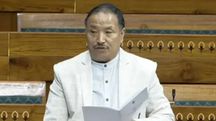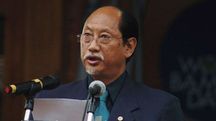Nagaland government reconstitutes panel to review reservation policy
The Nagaland government has restructured the committee responsible for reviewing the state’s reservation policy, following concerns raised by tribal bodies demanding a more balanced and neutral approach.

The Nagaland government has restructured the committee responsible for reviewing the state’s reservation policy, following concerns raised by tribal bodies demanding a more balanced and neutral approach.
The newly formed panel, now composed entirely of senior government officials, will be known as the Reservation Review Committee, government spokesperson K.D. Keyne announced on Wednesday.
Keyne stated that the earlier composition, which included tribal or block-wise representatives, has been revised after the disbandment of the earlier five-tribes Committee on Review of Reservation Policy (CoRRP). The reconstituted committee will be chaired by the former Development Commissioner, R. Ramakrishna. Ex-officio members will include senior officers from the Department of Personnel and Administrative Reforms (P&AR), Law and Justice Department, and the Home Commissioner’s Office, with the Commissioner & Secretary, P&AR serving as the Member Secretary.
The committee has been given six months from the date of appointment to complete its review and submit recommendations to the government. “After the last memorandum and submissions made by the five tribes — Ao, Angami, Lotha, Rengma, and Sumi — it was decided that the review body should be more neutral and led by senior officials,” Keyne added.
The renaming of the body from Commission from Job Reservation Review to Commission for Review of Reservation reflects the government’s acknowledgment that the issue extends beyond job quotas to other social and administrative dimensions. Keyne emphasized that the review aligns with the ongoing National Census Exercise, ensuring data-backed policy adjustments.
Also Read: ‘Strike to continue until fairness restored’: JCC warns Nagaland govt on IAS induction irregularities
Expressing optimism, Keyne said, “The government has listened to all sides. This newly formed committee will bring clarity, fairness, and finality to a long-pending issue that has stirred both political and administrative debate in Nagaland.”
The demand for a review gained momentum after five tribal apex bodies under the banner of the 5-Tribes CoRRP submitted a joint memorandum to the state government earlier this year, arguing that the 1977 reservation policy no longer reflects current socioeconomic realities. Initially, Nagaland’s policy had earmarked 25 percent reservation for backward tribes for 10 years — 3 percent for the eastern backward area and 12 percent for other backward tribes.
Over the decades, tribal groups have pressed for revisions, citing disproportionate representation and changing educational dynamics. The reconstituted panel now aims to deliver a framework ensuring equitable opportunity across all communities within the state.
Copyright©2026 Living Media India Limited. For reprint rights: Syndications Today









